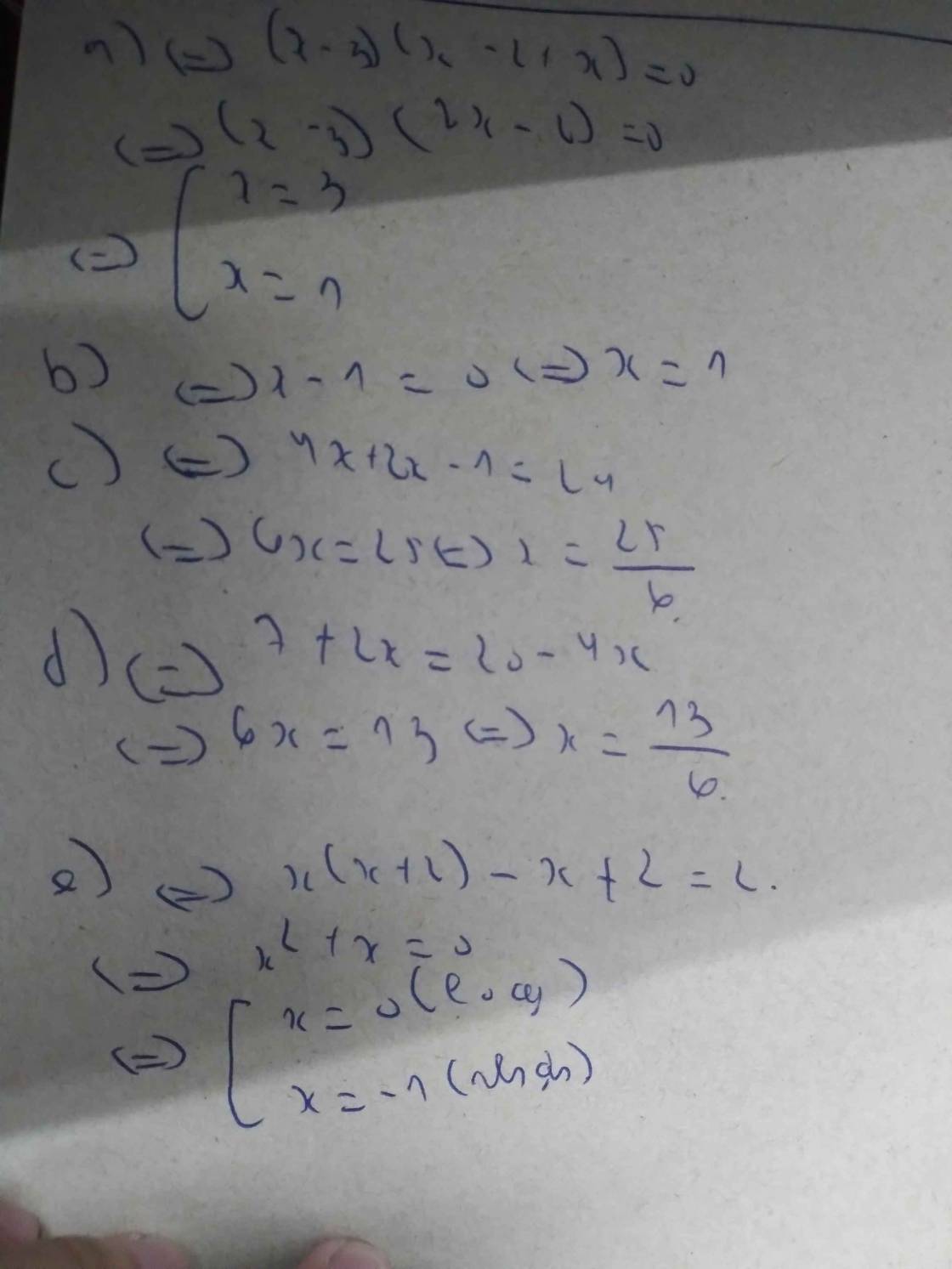
Hãy nhập câu hỏi của bạn vào đây, nếu là tài khoản VIP, bạn sẽ được ưu tiên trả lời.


2:
a: =>x-1=0 hoặc 3x+1=0
=>x=1 hoặc x=-1/3
b: =>x-5=0 hoặc 7-x=0
=>x=5 hoặc x=7
c: =>\(\left[{}\begin{matrix}x-1=0\\x+5=0\\3x-8=0\end{matrix}\right.\Leftrightarrow x\in\left\{1;-5;\dfrac{8}{3}\right\}\)
d: =>x=0 hoặc x^2-1=0
=>\(x\in\left\{0;1;-1\right\}\)

b) Đặt \(x^2+2x+3=a\)(a>0)
Ta có: \(\dfrac{x^2+2x+7}{\left(x+1\right)^2+2}=x^2+2x+4\)
\(\Leftrightarrow\dfrac{x^2+2x+7}{x^2+2x+1+2}=x^2+2x+4\)
\(\Leftrightarrow\dfrac{x^2+2x+7}{x^2+2x+3}=x^2+2x+4\)
\(\Leftrightarrow\dfrac{a+4}{a}=a+1\)
\(\Leftrightarrow a^2+a=a+4\)
\(\Leftrightarrow a^2=4\)
\(\Leftrightarrow\left[{}\begin{matrix}a=2\left(nhận\right)\\a=-2\left(loại\right)\end{matrix}\right.\)
\(\Leftrightarrow x^2+2x+3=2\)
\(\Leftrightarrow x^2+2x+1=0\)
\(\Leftrightarrow\left(x+1\right)^2=0\)
\(\Leftrightarrow x+1=0\)
hay x=-1
Vậy: S={-1}
ĐKXĐ của cả 2 pt trên đều là `x in RR`
`a,1/(x^2-2x+2)+2/(x^2-2x+3)=6/(x^2-2x+4)`
Đặt `a=x^+2x+3(a>=2)` ta có:
`1/(a-1)+2/a=6/(a+1)`
`<=>a(a+1)+2(a-1)(a+1)=6a(a-1)`
`<=>a^2+a+2(a^2-1)=6a^2-6a`
`<=>a^2+a+2a^2-2=6a^2-6a`
`<=>3a^2-5a+2=0`
`<=>3a^2-3a-2a+2=0`
`<=>3a(a-1)-2(a-1)=0`
`<=>(a-1)(3a-2)=0`
`a>=2=>a-1>=1>0`
`a>=2=>3a-2>=4>0`
Vậy pt vô nghiệm
`(x^2+2x+7)/((x+1)^2+2)=x^2+2x+4`
`<=>(x^2+2x+7)=(x^2+2x+4)(x^2+2x+3)`
Đặt `a=x^2+2x+3(a>=2)`
`pt<=>a+4=a(a+1)`
`<=>a^2+a=a+4`
`<=>a^2=4`
`<=>a=2` do `a>=2`
`<=>(x+1)^2+2=2`
`<=>(x+1)^2=0`
`<=>x=-1`
Vậy `S={-1}`

a. 3(x-2)-10=5(2x + 1)
<=> 3x - 6 - 10 = 10x + 5
<=> 3x - 10x = 5 + 6 + 10
<=> -7x = 21
<=> x = -3
b. 3x + 2=8 -2(x-7)
<=> 3x + 2 = 8 - 2x + 14
<=> 3x + 2x = 8 + 14 - 2
<=> 5x = 20
<=> x = 4
c. 2x-(2+5x)= 4(x + 3)
<=> 2x - 2 - 5x = 4x + 12
<=> 2x - 5x - 4x = 12 + 2
<=> -7x = 14
<=> x = -2
d. 5-(x +8)=3x + 3(x-9)
<=> 5 - x - 8 = 3x + 3x - 27
<=> -x - 3x - 3x = -27 + 8 - 5
<=> -7x = -24
<=> x = 24/7
e. 3x - 18 + x= 12-(5x + 3)
<=> 3x - 18 + x = 12 - 5x - 3
<=> 3x + x - 5x = 12 - 3 + 18
<=> -x = 27
<=> x = - 27
a. 3(x-2)-10=5(2x + 1)
<=> 3x - 6 - 10 = 10x + 5
<=> 3x - 10x = 5 + 6 + 10
<=> -7x = 21
<=> x = -3
b. 3x + 2=8 -2(x-7)
<=> 3x + 2 = 8 - 2x + 14
<=> 3x + 2x = 8 + 14 - 2
<=> 5x = 20
<=> x = 4
c. 2x-(2+5x)= 4(x + 3)
<=> 2x - 2 - 5x = 4x + 12
<=> 2x - 5x - 4x = 12 + 2
<=> -7x = 14
<=> x = -2
d. 5-(x +8)=3x + 3(x-9)
<=> 5 - x - 8 = 3x + 3x - 27
<=> -x - 3x - 3x = -27 + 8 - 5
<=> -7x = -24
<=> x = 24/7
e. 3x - 18 + x= 12-(5x + 3)
<=> 3x - 18 + x = 12 - 5x - 3
<=> 3x + x - 5x = 12 - 3 + 18
<=> -x = 27
<=> x = - 27

a: \(\Leftrightarrow x\left(2x+10\right)-x\left(x-2\right)=0\)
=>x(2x+10-x+2)=0
=>x(x+12)=0
=>x=0 hoặc x=-12
b: \(\Leftrightarrow\left(2x-5\right)\left(x+11\right)+\left(2x-5\right)\left(2x+1\right)=0\)
=>(2x-5)(3x+12)=0
=>x=5/2 hoặc x=-4
c: \(\Leftrightarrow\left(2x\right)^2-\left(x+3\right)^2=0\)
=>(x-3)(3x+3)=0
=>x=3 hoặc x=-1
d: \(\Leftrightarrow\left(x+2\right)\left(5-4x\right)-\left(x+2\right)^2=0\)
\(\Leftrightarrow\left(x+2\right)\left(5-4x-x-2\right)=0\)
=>(x+2)(-5x+3)=0
=>x=-2 hoặc x=3/5
\(a,\left(x-2\right)x=2x\left(x+5\right)\)
\(\Leftrightarrow\left(x-2\right)x-2x\left(x+5\right)=0\)
\(\Leftrightarrow x.\left(x-2-2x-10\right)=0\)
\(\Leftrightarrow x\left(-x-12\right)=0\Leftrightarrow\left\{{}\begin{matrix}x=0\\x+12=0\end{matrix}\right.\Rightarrow\left\{{}\begin{matrix}x=0\\x=-12\end{matrix}\right.\)

a) Ta có: \(\left|x^2-x+2\right|-3x-7=0\)
\(\Leftrightarrow\left|x^2-x+2\right|=3x+7\)
\(\Leftrightarrow x^2-x+2=3x+7\)(Vì \(x^2-x+2>0\forall x\))
\(\Leftrightarrow x^2-x+2-3x-7=0\)
\(\Leftrightarrow x^2-4x-5=0\)
\(\Leftrightarrow x^2-5x+x-5=0\)
\(\Leftrightarrow x\left(x-5\right)+\left(x-5\right)=0\)
\(\Leftrightarrow\left(x-5\right)\left(x+1\right)=0\)
\(\Leftrightarrow\left[{}\begin{matrix}x-5=0\\x+1=0\end{matrix}\right.\Leftrightarrow\left[{}\begin{matrix}x=5\\x=-1\end{matrix}\right.\)
Vậy: S={5;-1}
bạn giải giúp mình câu b nữa với
mai mình phải nộp bài rồi!!!![]()

1: \(\Leftrightarrow\left(x-4\right)^2+14=-9\left(x-4\right)\)
\(\Leftrightarrow x^2-8x+16+14+9x-36=0\)
\(\Leftrightarrow x^2+x-6=0\)
=>(x+3)(x-2)=0
=>x=-3(nhận) hoặc x=2(nhận)
2: \(\Leftrightarrow\left(8x+1\right)\left(2x-1\right)-2x\left(2x+1\right)-12x^2+9=0\)
\(\Leftrightarrow16x^2-8x+2x-1-4x^2-2x-12x^2+9=0\)
=>-8x+8=0
hay x=1(nhận)
c: \(\dfrac{1}{2\left(x-3\right)}-\dfrac{3x-5}{\left(x-3\right)\left(x-1\right)}=\dfrac{1}{2}\)
\(\Leftrightarrow x-1-2\left(3x-5\right)=\left(x-3\right)\left(x-1\right)\)
\(\Leftrightarrow x^2-4x+3=x-1-6x+10=-5x+9\)
\(\Leftrightarrow x^2+x-6=0\)
=>(x+3)(x-2)=0
=>x=-3(nhận) hoặc x=2(nhận)

\(a,\left(2x-3\right)^2=\left(x+1\right)^2\\ \Leftrightarrow\left(2x-3\right)^2-\left(x+1\right)^2=0\\ \Leftrightarrow\left(2x-3+x+1\right)\left(2x-3-x-1\right)=0\\ \Leftrightarrow\left(3x-2\right)\left(x-4\right)\\ \Leftrightarrow\left[{}\begin{matrix}3x-2=0\\x-4=0\end{matrix}\right.\\ \Leftrightarrow\left[{}\begin{matrix}3x=2\\x=4\end{matrix}\right. \\ \Leftrightarrow\left[{}\begin{matrix}x=\dfrac{2}{3}\\x=4\end{matrix}\right.\)
Vậy \(x\in\left\{\dfrac{2}{3};4\right\}\)
\(b,x^2-6x+9=9\left(x-1\right)^2\\ \Leftrightarrow\left(x-3\right)^2=9\left(x-1\right)^2\\ \Leftrightarrow\left(x-3\right)^2-9\left(x-1\right)^2=0\\ \Leftrightarrow\left(x-3\right)^2-3^2\left(x-1\right)^2=0\\ \Leftrightarrow\left(x-3\right)^2-\left[3\left(x-1\right)\right]^2=0\\ \Leftrightarrow\left(x-3\right)^2-\left(3x-3\right)^2=0\\ \Leftrightarrow\left(x-3+3x-3\right)\left(x-3-3x+3\right)=0\\ \Leftrightarrow-2x\left(4x-6\right)=0\\ \Leftrightarrow\left[{}\begin{matrix}-2x=0\\4x-6=0\end{matrix}\right.\\ \Leftrightarrow\left[{}\begin{matrix}x=0\\4x=6\end{matrix}\right.\\ \Leftrightarrow\left[{}\begin{matrix}x=0\\x=\dfrac{3}{2}\end{matrix}\right.\)
Vậy \(x\in\left\{0;\dfrac{3}{2}\right\}\)

\(7-\left(2x+4\right)=-\left(x+4\right)\)
\(\Rightarrow7-\left(2x+4\right)=-\left(2x-3\right)\)
\(\Rightarrow-\left(2x-3\right)=-\left(x+4\right)\)
\(\Rightarrow3-2x=-x-4\)
\(\Leftrightarrow-x=-7\)
\(\Leftrightarrow x=7\)
a) 7-(2x+4)=-(x+4)
7 - 2x -4 = -x - 4
7 - 4 + 4 = 2x - x
7 = x
x = 7
b) (x-1) - (2x - 1) = 9 - x
x - 1 - 2x +1 = 9 - x
x - 2x + x = 9
0x = 9( vô lí)
không có giá trị của x thỏa mãn yêu cầu